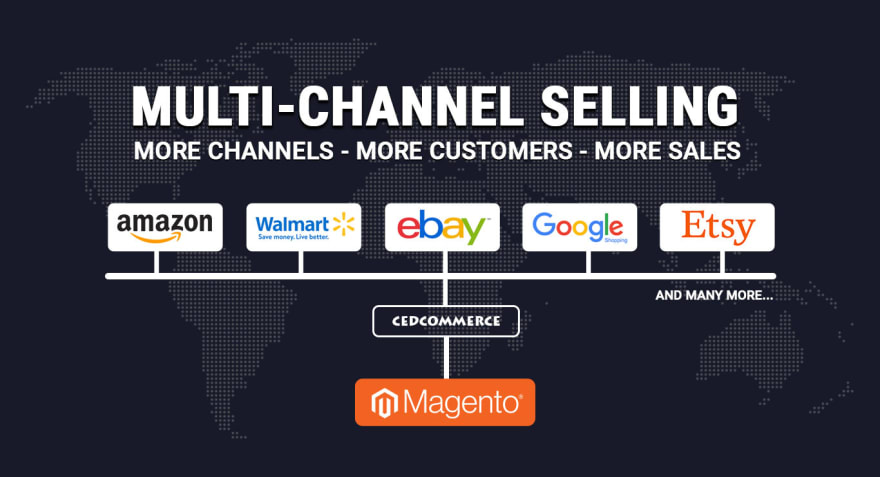The mantra to remain successful in online retail businesses, one should follow in the footsteps of their customers. Looking at the current user behaviors and patterns, the current mantra for successful online shopping is multi-channel selling (aka multichannel eCommerce).
Your customers love to consider a range of options (in case of online shopping, it is various marketplaces) before deciding to buy a product. So as a seller, it becomes your responsibility to be present on all the possible channels (marketplaces) where your customers buy.
Why Multichannel Selling Is Important For Online Retailers?
Multichannel is the Future: Since your customers are evolving and so must you!!! Its now time to redefine the traditional single-channel selling and switch to multi-channel selling – the future of eCommerce!
More channels mean More Revenue: On average, multi-channel selling and marketing increase revenue by 38%, 120%, and 190% with each additional channel. (Source: Shopify). This means that adding more channels to your selling list will prove useful for your overall revenue.
Change in Customer Interest & Shopping Behaviours: Consumers like to shop across a range of channels before deciding to buy a product. So to meet your customers on all these channels, you must need to be present here.
To understand multi-channel selling, we must first learn the definition.
What is Multi-Channel Selling? The Definition.
Some define multi-channel selling as the selling or being present at every possible online channel (website or marketplaces) customers prefer to shop. Others define multi-channel selling as a combination of brick-and-mortar, catalog, and Internet activity.
But
To understand the real definition even better, let’s put it this way.
The term ‘Channel‘ in Multichannel can range from a small individual website to online marketplaces (such as Amazon, Walmart, eBay, etc.) to different mobile marketplaces (such as Etsy, Wish) and even on social media channels (like Facebook shops).
These modes can be various online channels, single websites, public marketplaces, and even shopping-comparison sites.
“The multi-channel environment offers companies an ability to reach customers who would have had a challenging time finding a specific website.”
It found that multichannel eCommerce shoppers are more valuable than customers who shop via a single sales channel. These statistics will help you understand this statement even better.
Statistics About Multi-Channel Selling?
Here are some statistics that unveils the significance of multi-channel retailing:
- According to Wharton, 66% of online shoppers rely on more than one channel for purchases.
- Multi-channel shoppers have a 12% greater buying frequency compared to the traditional shoppers who rely on a single channel
- Multi-channel eCommerce customers have a 32% higher annual spending history than customers who shop at brick-and-mortar only.
- A research found that tri-channel (retail, catalog, Internet) shoppers are more loyal customers compared to those who purchase from just one or two channels.
- 73 percent of retailers find selling across multiple channels to be significant; only 38 percent consider selling on a single platform.
What Are The Advantages Of multi-channel selling or multi-channel eCommerce?
Selling products from your store to multiple channels entitles you with these benefits:
- Expand the range of selling – global coverage
- Create A Unified Experience
- Increase Customer Base
- Focus on Select Target Markets
- Reduce/Diversify risk
- Enhance Product Visibility
- Improve Customer Perception
Features of Multi-channel selling integration:
- Real-Time Sync: The two-way data flow and automated crons keep the stats and figures updated on all ends in real-time.
- Centralized dashboard: An automated and centralized dashboard to monitor and manage the sales on multiple channels.
- Inventory Management – Create any number of product catalogs and list them on multiple channels (marketplaces)
- Order Management: Manage Orders received from all the channels and accept/reject/ship from the store’s backend.
- Onc-click product upload and delete: Upload & Remove products from your store to marketplaces in bulk.
- Expand business cross borders: Get a chance to expand your business overseas by listing products cross borders.
Which is the Best Multi-Channel Selling Integration For Magento?
The best multi-channel eCommerce platform that covers every small and minute requirement of an online seller is the Magento multi-channel integration by Cedcommerce.
This efficient tool establishes perfect real-time sync between your store and any number of marketplaces you wish to sell.
Cedcommerce Magento multi-channel selling integration can connect your Magento store with more than 50+ online selling channels across the world, including Amazon, Walmart, eBay, Etsy, Facebook, etc.




Top comments (0)